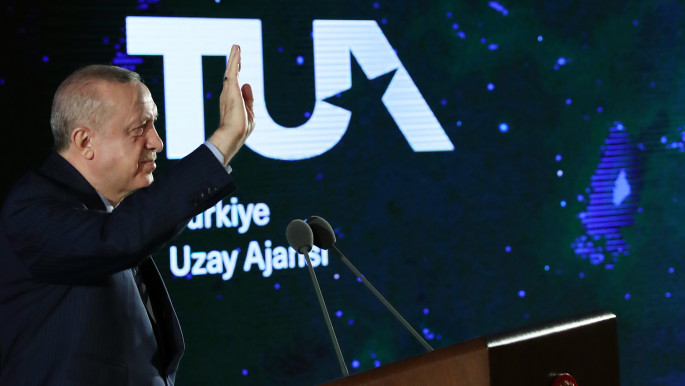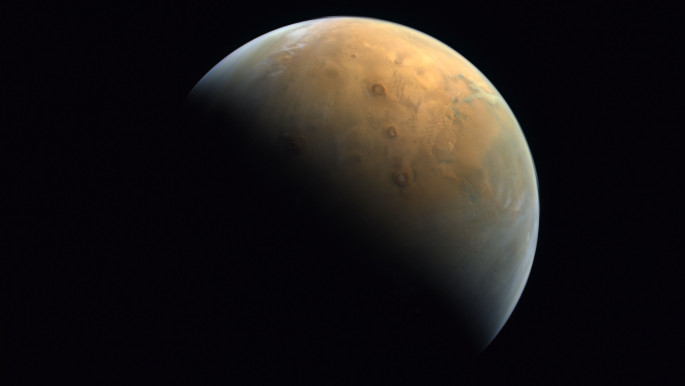Is there a space race in the Middle East?
Space is becoming an important realm for development and economic growth, with big technology companies such as Tesla and Amazon increasingly interested in space as the next economic frontier - and Middle Eastern powers do not intend to lag behind.
While Israel has largely been the leader in the regional space race, several other countries are fast closing the gap. Iran, Saudi Arabia, the UAE, Egypt as well as Turkey, are all rapidly developing their space programs. So far, Israel and Iran have been the only regional powers capable of constructing and launching satellites from their own territories.
The Middle East reaches for space
Saudi Arabia, along with Israel, has for decades been ahead of its neighbours in the space race. Riyadh took the initiative in establishing the multinational satellite communications company Arabsat in 1976 and sent the first Arab astronaut Prince Sultan bin Salman into space in 1985.
In the past decade, Saudi Arabia has again expressed ambitions to continue with space exploration and last fall announced that it would invest $2.1 billion in their space program by 2030. So far, the kingdom has launched 16 satellites. In December 2018, Saudi Arabia also created its own space agency.
 |
Space is becoming an important realm for development and economic growth, and Middle Eastern powers do not intend to lag behind |  |
Iran has also recognised the strategic value of space capabilities and has been trying to catch up with its regional rivals. Although in recent years Iran's satellite program has faced a series of failures, as well as possible sabotages, last April it successfully launched the country's first military satellite, Noor-1, into orbit. The launch was carried out on the 41st anniversary of the Islamic Revolutionary Guard Corps's establishment.
Previously, Iran successfully placed satellites into orbit in 2009, 2011 and 2012 and has received valuable assistance from China, Russia and North Korea. However, Iran's space program has been closely linked with the rapid development of its ballistic missiles, with the US, Israel and other Gulf states watching with concern.
The Trump administration accused Iran of violating a 2015 UN Security Council resolution that calls on Tehran to refrain from activities related to ballistic missiles capable of delivering nuclear weapons, but Iran rejected these accusations claiming that UN Security Council Resolution 2231 does not ban it from launching satellites.
 |
|
| Read more: Erdogan lays out ambitious Turkish plan to land on the moon by 2023 |
The UAE has probably made the greatest breakthrough over the shortest period of time in developing its space capabilities. In the last 15 years, the UAE has moved ahead of its Gulf neighbours and regional rivals. Emirati rulers have backed space exploration programs, investing an estimated $6 billion, while seeking to decrease the UAE's reliance on oil and boost the country's international reputation.
In the beginning, the UAE heavily depended on foreign expertise but ever since establishing its space centre in 2006, and space agency in 2014, domestic capabilities have steadily increased and in 2018 Abu Dhabi constructed its KhalifaSat satellite.
The following year, the UAE sent their first astronaut into space and now the Emiratis are focused on a Mars mission, which last month reached the Red planet's orbit, making the UAE's space agency the fifth agency to reach Mars. But their ultimate 100-year goal is reportedly to establish a human colony on Mars by 2117.
Turkey has also announced ambitious space plans to make its first contact with the moon in 2023 to mark the 100th anniversary of the Republic of Turkey. The second phase, a soft landing on the Moon, is planned for 2028. In February, during a news conference at the inauguration ceremony of the country's National Space Program, President Recep Tayyip Erdogan announced that the country will invest up to $1 billion in its space program and for the construction of locally produced hybrid rockets that would be launched into orbit in 2023, as well as a shuttle capable of carrying out scientific research. The project will require building a rocket launch site worth $350 million in Somalia, a close Turkish security partner since 2011.
 |
One of the most important drivers of the emerging Middle Eastern space race is economic diversification |  |
Distraction from other issues?
Some critics of the Middle East's space programs point out that technological achievements can often be used to whitewash deeper governance flaws, as part of an international marketing strategy to portray countries as forward-looking and progressive while covering up dismal human rights records or involvement in regional wars.
Dr. Douglas Vakoch, president of METI International (Messaging Extraterrestrial Intelligence), argues that a country cannot repudiate the scientific view of the world and simultaneously foster a mindset that encourages the innovation needed for interplanetary travel.
"A progressive scientific attitude is a prerequisite for successful space exploration, but that doesn't mean that every country that reaches the Red Planet has a pristine human rights record," he told The New Arab. "Progress has many dimensions - from scientific to social - and they don't always advance at the same pace."
According to Professor Jorg Matthias Determann, Associate Professor of History, Science, Technology and Society at Virginia Commonwealth University School of the Arts in Qatar, hi-tech projects including space programs sometimes serve to distract public opinion – and domestic and international attention - from more difficult and complex issues. But this is not unique to the Middle East, he says, recalling that the American Apollo program in the 1960s, for example, also shifted attention away from the civil rights struggle and the Vietnam War.
With many Middle Eastern states often labelled as conservative, or reactionary, their pursuit and use of hi-tech space exploration is a way to change international stereotypes, Determann suggests.
 |
|
| Read more: UAE's 'Hope' probe sends home first image of Mars |
Motives for space competition
There has also been a debate about the motives behind the Middle East's space competition and whether spaceflight is driven by strategic challenges, politics, or prestige. According to Vakoch, cynics often reduce the drive for space exploration to a thirst for national prestige. While any country that launches a successful space mission will enhance its international reputation as a leader of technological innovation, that reputation is still built by taking calculated risks, and by executing a huge scientific enterprise.
At the same time, however, the prestige of technological advancements undoubtedly increases the stature of a country politically, diplomatically and militarily, giving a greater voice when discussing regional issues. There's also growing evidence that space will play a role in the battle for military dominance in the Gulf.
The competition for influence in the Gulf has already intersected with space technology in terms of satellite telecommunications as a key element of soft power, Determann notes. Besides competition between regional networks, the Gulf blockade of 2017 called for banning Qatar's Al Jazeera channel while Saudi Arabia also blocked Qatar-based TV channel beIN Sports.
Last year, the World Trade Organisation found that Riyadh had breached global rules after blocking beIN from broadcasting and refusing to take action against alleged piracy of its content by beoutQ, a commercial-scale pirating operation. In Determann's view, telecommunication satellites are key elements of information competition and form part of the space race.
In addition, he observes that smaller states are seeking a qualitative military edge by developing and introducing advanced technologies, including space technologies, as their size or small population means they cannot compete with other regional and world powers.
 |
There's growing evidence that space will play a role in the battle for military dominance in the Gulf |  |
Economic diversification as a key driver
Finally, one of the most important drivers of the emerging Middle Eastern space race is economic diversification, as countries seek to decrease their reliance on oil and gas and develop sectors such as tourism and technology. In Vakoch's view, any country that wishes to thrive in the coming decades must take into account the long-term trajectory of its natural resources.
The economies of Gulf states have their basis in oil, with leaders attempting to think beyond current market conditions and build on their country's economic strength to plan a path for sustained wealth even after the world shifts to renewable energy resources.
 |
|
| Read more: Israel launches new spy satellite as Iran tensions continue |
Vakoch says that space exploration has also consistently yielded useful spin-off technologies. "By developing propulsion systems for increasingly ambitious future missions into the depths of the outer solar system, future generations of Emiratis could have innovative technologies for energy production for use in the UAE and elsewhere in the world," he told The New Arab.
This, of course, raises the issue of whether they will be able to translate space technologies into a wider economic benefit and not repeat the mistake of the Soviet Union, who, despite leading the space race, failed to apply innovations on a broader scale.
For many technologically advanced nations, the key to sustaining continued scientific development is fostering a highly educated workforce, Vakoch added. Space exploration, according to him, generates tremendous enthusiasm in science starting with the youngest school children. Even though only a tiny fraction of these students will work in the space industry as adults, their early curiosity about the cosmos creates the foundation for careers across the sciences.
Stasa Salacanin is a freelance journalist who has written extensively on Middle Eastern affairs, trade and political relations, Syria and Yemen, and terrorism and defence.




 Follow the Middle East's top stories in English at The New Arab on Google News
Follow the Middle East's top stories in English at The New Arab on Google News


